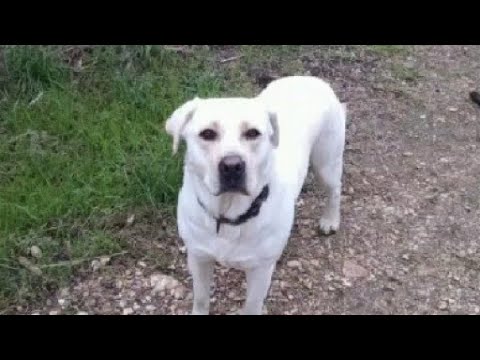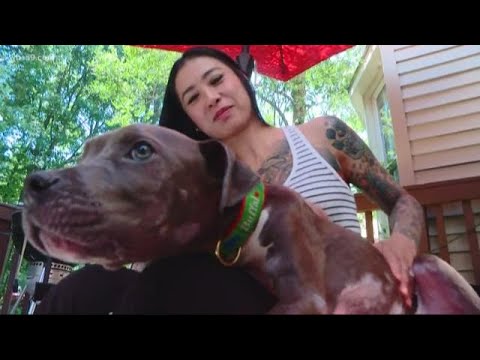Sleepless nights, baggy eyelids, and bloodshot eyes. These are all common bulldog owner symptoms caused by the non stop snoring of a beloved pet throughout the night. Yes, bulldogs snore, A LOT, but they are soooo cute and wonderful pets otherwise. But the snoring can put anyone on edge. These aren’t light snores every now and then either. What comes out of a bulldogs mouth in its sleep is otherworldly. Like a freight train driving into a nitroglycerin plant…okay maybe not that loud but you get the idea. But were you ever aware that not all dogs snore?
So, why to bulldogs snore? There are several reasons actually, ranging from their sleep position, possible allergies or having a common cold. But the biggest culprit is their scrunched up, pushed in faces. This is known as brachycephalic condition which leads to all types of breathing issues to include snoring.
These wrinkly, fuzz balls can’t help what is ingrained in their genetics but lucky for you there are a few things that can be done to minimize the noise.
One Culprit of a Snoring Bulldog – Brachycephalic or Respiratory System
Part of the reason bulldogs snore are their scrunched, pushed in faces which can create lifelong respiratory issues. Some respiratory issues are more severe than others. A bulldog with brachycephalic will have air passways that are more narrow, potentially blocked, or irregular. This in turn will impede a clear flow of air into the lungs. A Bulldogs breathing will sound more labored or wheezy due to this condition. This respiratory condition further explains all the funny noises and grunts that will be heard coming from a bulldog. But again this is not all fun and games. It is serious business to understand what this condition is and how to best nurture and treat a pet with a pushed in face.
A few things to be aware of that can occur from your bulldog having respiratory conditions are as follows:
- Snoring While Sleeping – As you can begin to understand, your bulldog will snore through the night, in most cases.
- Gagging Easily – Whether eating, chewing on something, or just plan breathing you may notice more gagging then most pets. This is common and typically okay, as long as a foreign object is not lodged in your bulldogs throat.
- Excessive Oxygen Intake – Bulldogs tend to over breathe at times, especially while they eat. If a bulldog ever eats too much that means bloating and gas. Which create other uncomfortable situations while you and your bulldog sleep during the night.
- Overheating – A bulldogs need daily exercise and should step outside everyday. But exercise extreme caution in the heat. During hot days or longer walks your bulldogs raspy breathing can faint, overheat, or even have a stroke.
Allergies, Obesity, and Colds Can Make Your Bulldog Snore
So a bulldog with a less than desired respiratory system is only one problem in a long list of issues. Bulldogs deal with other health conditions like: allergies, obesity, and the common cold. All of which can have negative effects on your resting pooch and the volume or frequency at which it snores.
Allergies
Dogs are prone to allergies and that is no exception for a bulldog. If your bulldog has an allergic reaction this could flare up its sinuses, cause inflammation and swelling in their respiratory system and more. This reaction will affect the bulldogs breathing and most likely lead to more excessive snoring while it sleeps. Some common allergies to be aware of are:
- Bug Bites or Stings
- Tip: Give your bulldog anti-itch cream or vet prescribed medication if the reaction is severe.
- Food Allergies
- Tip: Monitor your bulldog, whether it’s new or you are changing its diet, to observe its reaction to new food. Food allergies can be anything from stomach sickness, itching, gas, etc. If something doesn’t seem right have a period of trial and error just cut your losses and move on to another dog food.
- Medication Allergies
- Tip: When your bulldog takes new medication know what type of side-effects are common. Just because a side-effect occurs doesn’t mean your dog is allergic. The medication may still be fine for the specific prescribed need. If the side-effects continue or your dog exhibits other severe reactions contact your vet for further medical guidance.
- Dust or Pollen
- Tip: Keep dust to a minimum in the home. Clean frequently which includes vacuuming, sweeping, and dusting. Wash regularly carpets, dog beds, etc. And change your air filter on a regular basis. This is a basic fix that is common missed but can have a substantial change to the air quality inside your home.
Seek help from a Veterinarian if your bulldog has a severe reaction to ANYTHING. Another important tip to decrease your bulldogs allergies is to avoid situations where smoking is present. If you are a chain smoker, please step outside and away from your pet to do it. This is for their best interest and yours. Second hand smoke can lead to additional health issues such as allergies.
Obesity
If your bulldog is obese there can be excessive fat build up in its throat. Because the air flow will be limited your bulldog will breathe heavier and snore heavier. A healthy bulldog is the best type of bulldog. Make regular exercise a daily routine and walk your bulldog at least 15 minutes. This will help shed unwanted weight when combined with a healthy diet. A healthier bulldog will breathe easier and sleep better. This includes a somewhat quieter snore, but there are many exceptions to this rule.
Common Cold
Bulldogs can get sick and if your bulldog is feeling under the weather and catches the common cold this will have implications on its respiratory system. Breathing will be more labored and this will affect the frequency and noise of its snore.
To help your bulldog fight this common cold you should do the following:
- Have your bulldog drink plenty of liquids.
- Continue to go on walks (even if they are slightly reduced) with your dog to maintain its peak condition while battling the flu.
- Feed your dog nutritious, high end dog food or organic meat and vegetables.
- Place a humidifier by its bed to reduce swelling and a constricted nasal passageway. A humidifier can also be used when your bulldog is not sick to potentially reduce its level of snoring on an average day.
The Wrong Sleeping Position = Snoring Bulldog
Another answer for the question, “Why do bulldogs snore?” is their sleep position. The type of sleep position a bulldog is in will open up the passageways differently in any respiratory system. Sleeping on the side, stomach, or back will have a different effect altering the volume of snoring, types of noises your dog makes, labored breathing, etc.
It is typical for a bulldog to snore when sleeping on its back and may snore even while on its side or stomach. To know which position is best for your bulldogs snoring try to reposition your dog when its sleeping. If the snoring wakes you, jump up and rotate your bulldog to see if another position with reduce or stop the snoring. Having your bulldog in the right sleeping position can be all that stands in your way of a good nights rest.
To Fix Snoring Surgery May be a Potential Solution
If snoring is getting out of hand and you notice that your bulldog is having a difficult time breathing, it may be time to take action. Seek the advice of an experienced Veterinarian that can address the matter head on and decide what the next best course of action may be for your bulldog. Each case is unique but a skilled Veterinarian, experienced with treating bulldogs, will be able to advise if surgery is a necessary treatment or if there are other alternatives.
Surgery to treat snoring bulldogs would be used to remove any obstructions to the bulldogs natural airflow in its respiratory system. Correction could be made to the bulldogs soft palate by trimming excess or remove of obstructions to expand the bulldogs nostrils.
When surgery is performed on your bulldog, you may see significant improvement. Some noticeable changes may be more energy, breathing easier, less noise (grumbles, snorts, gagging, etc.) and less snoring. These changes can seem minor but truly improve the overall quality of life for your bulldog and even for yourself (think less sleepless nights).
Surgery is a big decision so make sure that you are consulting with your Vet thoroughly. Make a list based off the professional feedback to visually see the good and bad with the surgery. Take time to ponder what you write on this list and on what the Vet said. At the end of the day you will need to make the decision that will be best for yourself and your bulldog. So make sure you are confident in the final decision.
Additional Advice for First Time Bulldog Owners and What to Expect
If you are shopping for your first bulldog, young or old, do some research. If buying from a breeder, request the parents health pedigree to review their historical medical information. I would recommend seeing the parents of the new pup as well to assess their health and wellness. Pay close attention to how the bulldog pup’s parents are breathing and observe their overall health. After these reviews and general observations, if you have any concerns regarding the bulldogs overall health and potentially inherited health related issues don’t feel pressured to buy right now. Step away and keep looking. Just because you want a bulldog now, doesn’t mean the first one you see is the right one. Remember, whatever breathing habits the parents are displaying will most likely be passed on to your newly purchased bulldog pup.
The same recommendation goes if adopting from a shelter. Listen to the bulldog and ask to go for a short walk. Watch how the bulldog can handle a short walk and if anything substantial stands out with its breathing. Is it displaying a shortage of breath, low energy, making loud noises when breathing, etc? What is your overall assessment of the bulldog? By recognizing potential health risks you should be able to decipher some of the warning signs of a loud snoring bulldog. Again, bulldogs will snore but you want an overall healthy bulldog with a good history. If none of these matter you know what to expect and the actions that can be done to minimize the overall snoring noise.
Takeaways to Minimize Your Bulldogs Snoring
A bulldog will most likely snore but you are fully capable of minimizing the noise and frequency of snoring. You can rest more peacefully and so can your bulldog by make change today! Do what’s right for your bulldog today by taking care of the following:
- Bulldogs physical health
- Providing respiratory care
- Seeking a veterinarians help
- Plan a well balanced diet
- Find your bulldogs best sleeping position
- Monitor for allergies
- Select a bulldog that has a well documented pedigree and attests to quality health
These simple, yet consistent steps will go a long way to minimize snoring in your bulldog.
Related Questions
Is it normal for a bulldog to snore? Yes it is due to their physical structure and flat faces. These physical conditions typically impede airflow in the respiratory system leading to more labored breathing and excessive snoring.
Is it normal for French bulldogs to snore? French bulldogs have those same inherited flaws where their faces are scrunched and obstructs airflow. Poor airflow will cause your French Bulldog to snore and the severity can determine how frequently and loudly it may snore.






